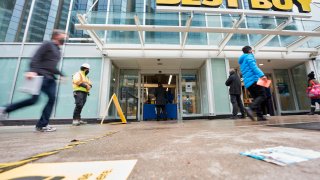
- Best Buy's fourth-quarter earnings beat Wall Street's expectations, but fell short on revenue.
- Sales growth slowed, and the retailer expects the pace will weaken even further as people shift spending away from their homes.
- CFO Matt Bilunas said the company expects same-store sales this year will range from a drop of 2% to a gain of 1%.
Best Buy's fourth-quarter earnings outpaced Wall Street's expectations Thursday, but it fell short on revenue as its sales growth slowed compared with earlier months of the pandemic.
The retailer said its sales will likely slow even further. Chief Financial Officer Matt Bilunas said same-store sales are expected to range from a drop of 2% to a gain of 1% this year. The forecast assumes that customers resume or accelerate spending in areas such as travel and dining out in the back half of the year, he said.
Best Buy's shares closed Thursday down about 9% to $102.94. Its stock has gained nearly 35% over the past year, bringing the company's market value to $26.66 billion.
Feeling out of the loop? We'll catch you up on the Chicago news you need to know. Sign up for the weekly Chicago Catch-Up newsletter here.
Here's what the company reported for the fiscal quarter ended Jan. 30 compared with what Wall Street was expecting, based on a survey of analysts by Refinitiv:
- Earnings per share: $3.48, adjusted, vs. $3.45 expected
- Revenue: $16.94 billion vs. $17.23 billion expected
Best Buy's fourth-quarter net income rose to $816 million, or $3.10 per share, up from $745 million, or $2.84 per share, a year earlier.
Money Report
Excluding items, it earned $3.48 per share, higher than the $3.45 per share expected by analysts surveyed by Refinitiv.
Net sales rose to $16.94 billion from $15.2 billion a year earlier but fell short of estimates of $17.23 billion.
Sales online and at stores open at least 14 months grew by 12.6%, less than the 14.7% growth that analysts expected, according to StreetAccount. That's a sharp decline from the growth rate of 23% in the third quarter.
While still strong, the pace of online sales growth in the U.S. slowed, too. It grew by 89.3% compared with 174% in the third quarter and 242% in the second quarter.
The retailer has benefited from stay-at-home restrictions that boosted purchases of equipment like computer monitors for the home office, headphones and laptops for children going to school remotely and kitchen appliances to make it easier to cook meals.
The soaring use of technology, however, has shaken up the way that people shop. Instead of wandering around the store floor, more customers have browsed the website, shipped purchases to their home or retrieved them in the company's parking lot.
Best Buy estimated that online sales will make up about 40% of total domestic sales in the year ahead.
That's had implications for Best Buy's workforce. On an earnings call, Best Buy CEO Corie Barry said the company began last fiscal year with 123,000 employees and ended the year with about 102,000 — a decline of roughly 21,000 or 17%. She said most of the reduced headcount came from attrition. Earlier this month, she said the company laid off about 5,000 employees, most of whom were full-time.
She said the company is committed to "reskilling and retraining" employees, as it makes organizational changes geared toward e-commerce. At some stores, for example, it is testing a design that reduces the size of the sales floor and uses more space to fulfill online orders.
"Like many retailers, we believe much of what we saw last year will be permanent," she said. "Our employees, and the stores will always be central to our strategy, we are simply looking at how we can best deploy our team and our physical assets to meet customer expectations and needs."
Best Buy said it plans to spend $750 million to $850 million on capital expenditures and buy back at least $2 billion in stock. Its board approved a 27% increase in the quarterly dividend to 70 cents per share.
Read Best Buy's press release here.






